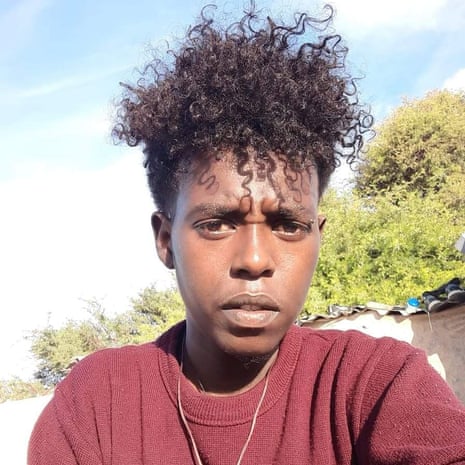A 16-year-old is the latest person to die in a network of Libyan detention centres where refugees and migrants are locked up indefinitely after they are returned to the war-torn north African country by the EU-funded coastguard.
Fellow detainees in Sabaa detention centre, Tripoli, named the boy as Adal Debretsion, an Eritrean who had reportedly been locked up for more than a year. They said the teenager died on 12 January of an unknown illness and a lack of medical care.
“We really feel sad and we are scared,” said another Eritrean, one of roughly 400 people still being held there. Friends said Adal was from Elabered, near Keren in Eritrea, and that he had left home three years ago at age 13. They said his mother had begged and struggled to find the high ransom smugglers demanded when he first reached Libya.
The Guardian spoke to refugees who were held with Adal in two different detention centres over the past two years, all of whom asked not to be named for security reasons. They said Adal tried to cross the Mediterranean to Europe in April 2018, after escaping mandatory, indefinite national service in Eritrea, which usually begins for all Eritreans when they finish school.
Another refugee, now in Rwanda, knew Adal in Triq al Sikka detention centre: “He was so brave, a hard working boy,” he said, adding that his friend escaped Eritrea because he was afraid of conscription.
He said Adal had filmed protests in Sabaa detention centre on a phone, showing detainees calling for help and evacuation. They sent the videos to journalists and activists.
“Everyone was so fond of him. I was devastated when I heard (of) his death,” he said.
Adal had been sleeping constantly for two weeks and was only given painkillers without any further medical referral, one friend said. A final attempt to take Adal to a private clinic failed, as he was already dead on arrival, he added.
“Our staff are still unable to verify the reports. These tragic incidents are a consequence of the increasingly dangerous conditions on the ground for all civilians trapped in areas of conflict, as well as aid workers who are sometimes unable to access certain areas due to security concerns,” said Safa Msehli, spokesperson for the International Organization for Migration, which has worked in the centre.
“Still we are living in fear,” said a detainee in Sabaa, while appealing for help for others. “Imagine if [there’s an] emergency, we [need] a doctor and they can’t arrive here quickly. A lot of people are struggling … Humanitarians must know. We don’t have to keep quiet. This thing will happen again.”
He said the weather is cold, there is not enough food and water from the tank is dirty. “Our bed sheets and blankets are dirty, we used to wash them with salt water, no soap or Omo [hand-washing powder].”
Refugees have recently been forced to work for the militia running Sabaa detention centre in exchange for food, he added. The centre is one of five in Tripoli where refugees and migrants have alleged that militias are using them as human shields and as forced labour for fighters in the war that began last April.
In March last year, an assessment by Médecins Sans Frontières (MSF) found that one in four detainees in Sabaa were malnourished or underweight.
“What we see today in this single detention centre is symptomatic of an uncontrolled, unjustified and reckless system that puts the lives of refugees and migrants at risk,” said Karline Kleijer, MSF’s head of emergencies.
“We’re talking about the basic necessities required to sustain human life. If food, shelter and essential services can’t be provided in a consistent and appropriate manner, then these people should be released immediately by the Libyan authorities.”
The Tripoli-based Government of National Accord, with which Sabaa detention centre has been associated, did not respond to a request for comment.
A UN Refugee Agency spokesperson said its staff last visited Sabaa in December, but “due to worsening security conditions, our staff have not been able to visit more recently”.
At an event in Berlin on Thursday, UNHCR special envoy for the central Mediterranean Vincent Cochetel laid out the problems the agency has accessing detention centres in Libya. “The militiaman may decide to let you in or not let you in. Even if you have the right papers you may not be able to go there,” he said. “We [don’t] have access to everywhere in the detention centre. Sometimes we plan to stay five or six hours and after 45 minutes we are told to leave … Once you go to a detention centre you are not sure you will be able to go back the day after or the week after or the month after.”
Cochetel said there are “awful conditions, disgusting, unacceptable … There are considerable risks. Lots of ethical dilemmas.”
While there is no official count of how many refugees and migrants are dying in Libyan detention centres, there have been reports of deaths from medical negligence, suicide, attacks by militias, and detainees being tortured to death or shot while trying to escape.
In Zintan detention centre, the UN confirmed that 22 detainees died between September 2018 and May 2019, including a young boy and his father.
